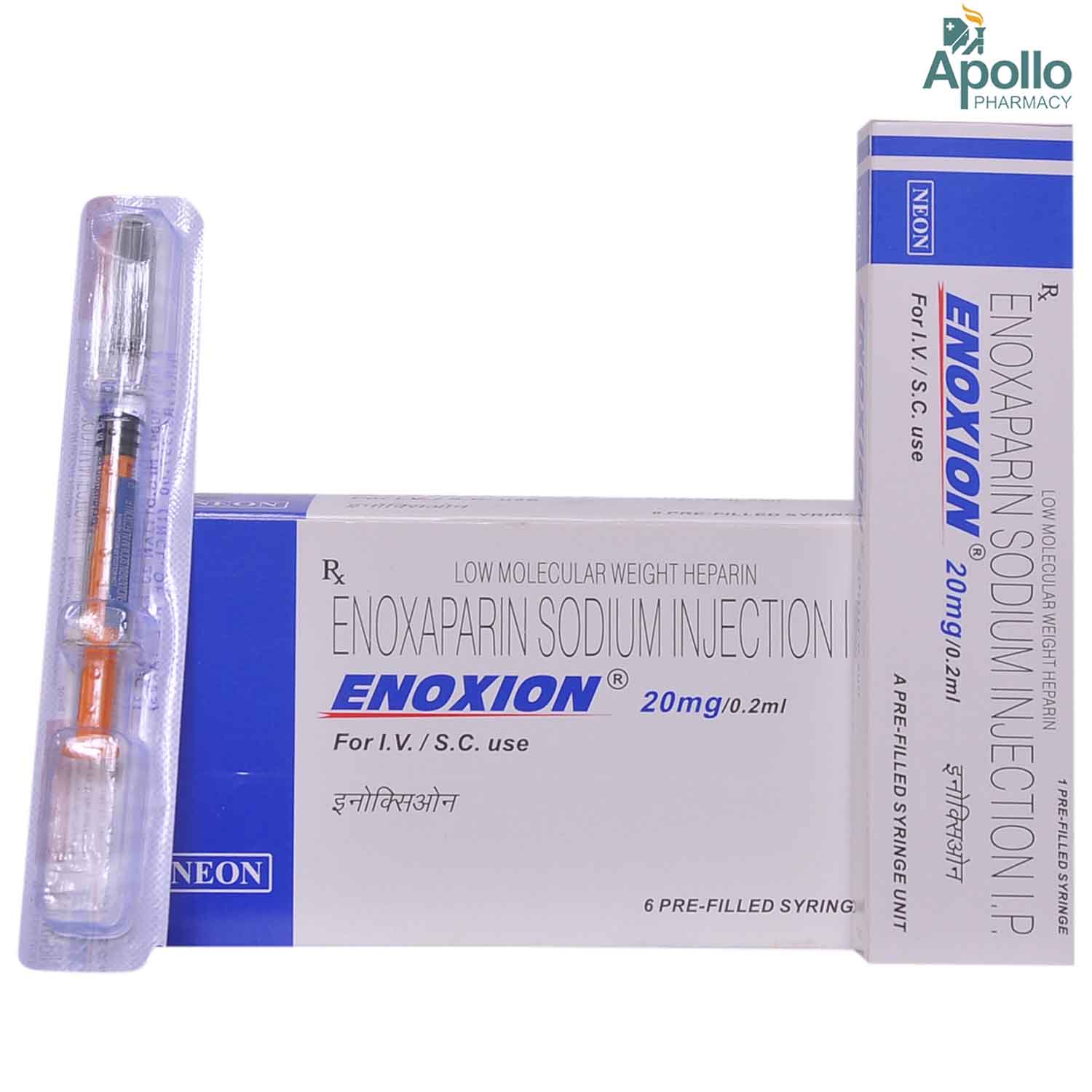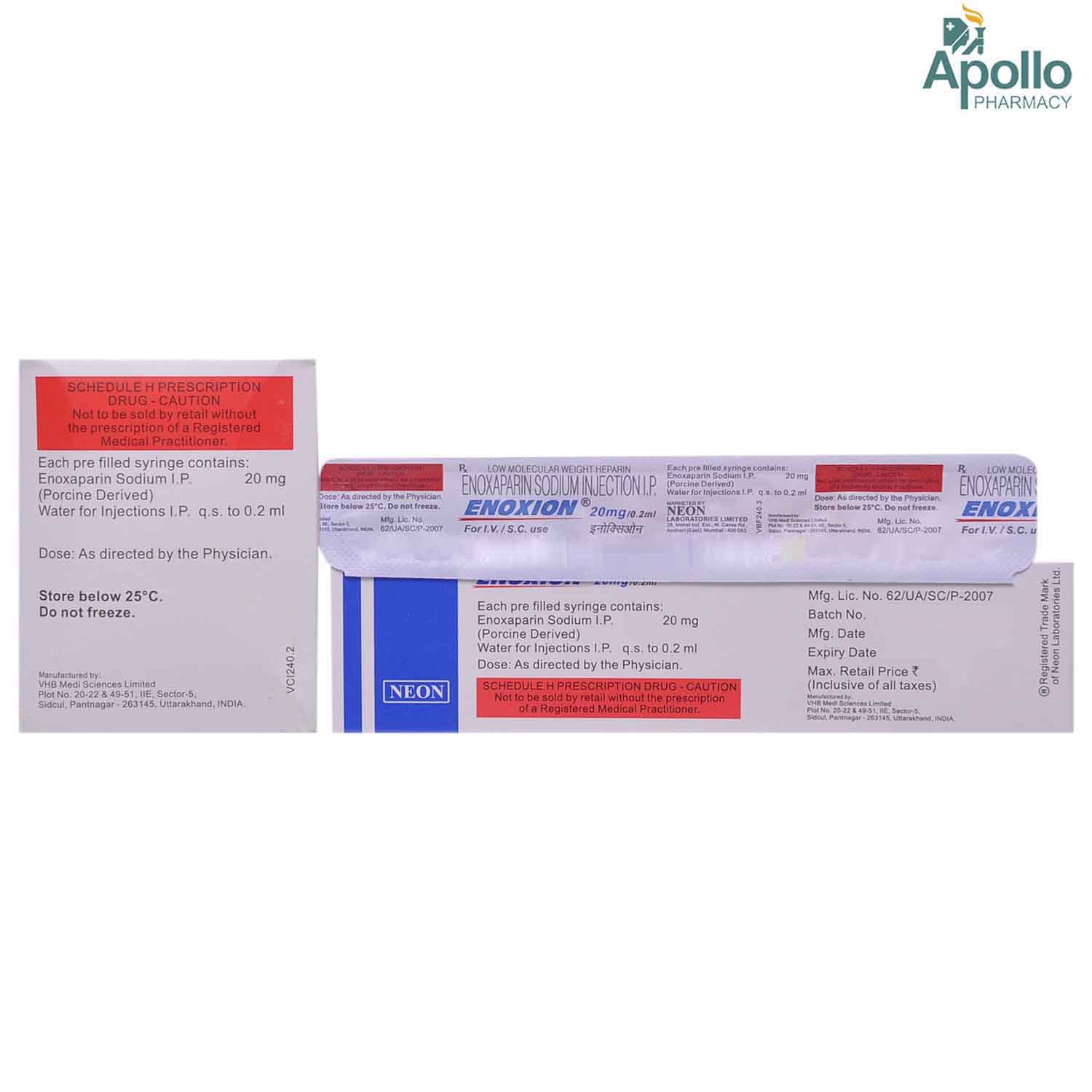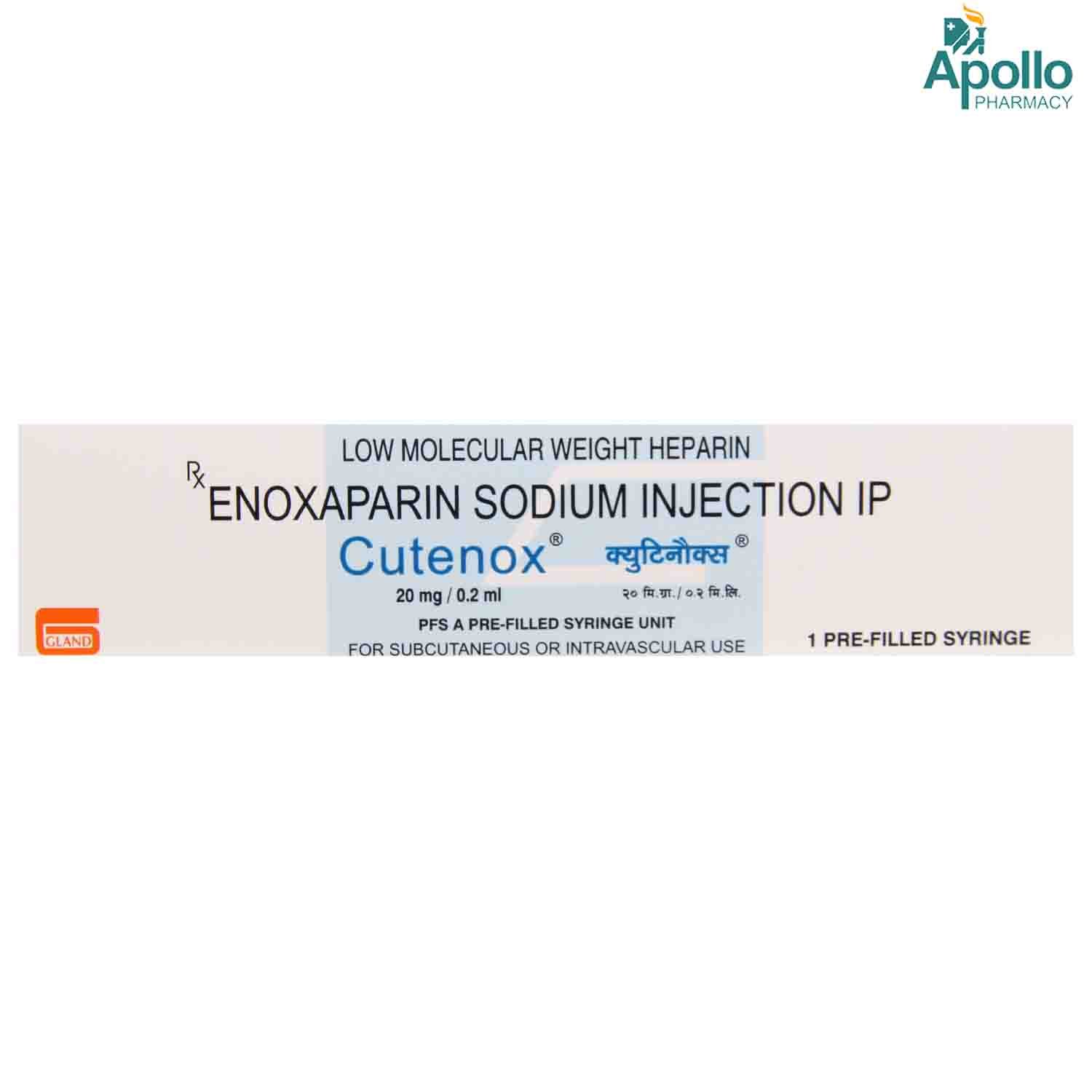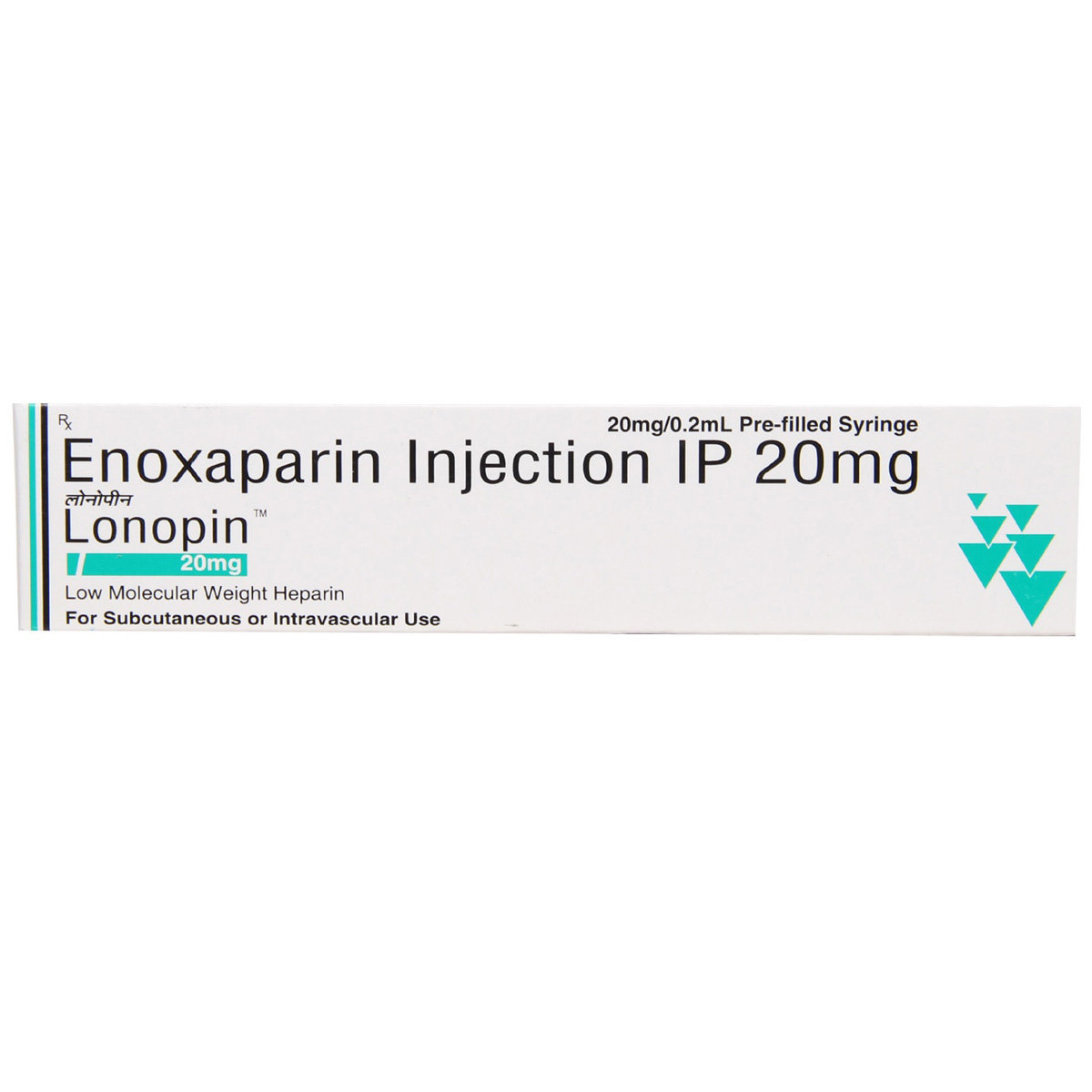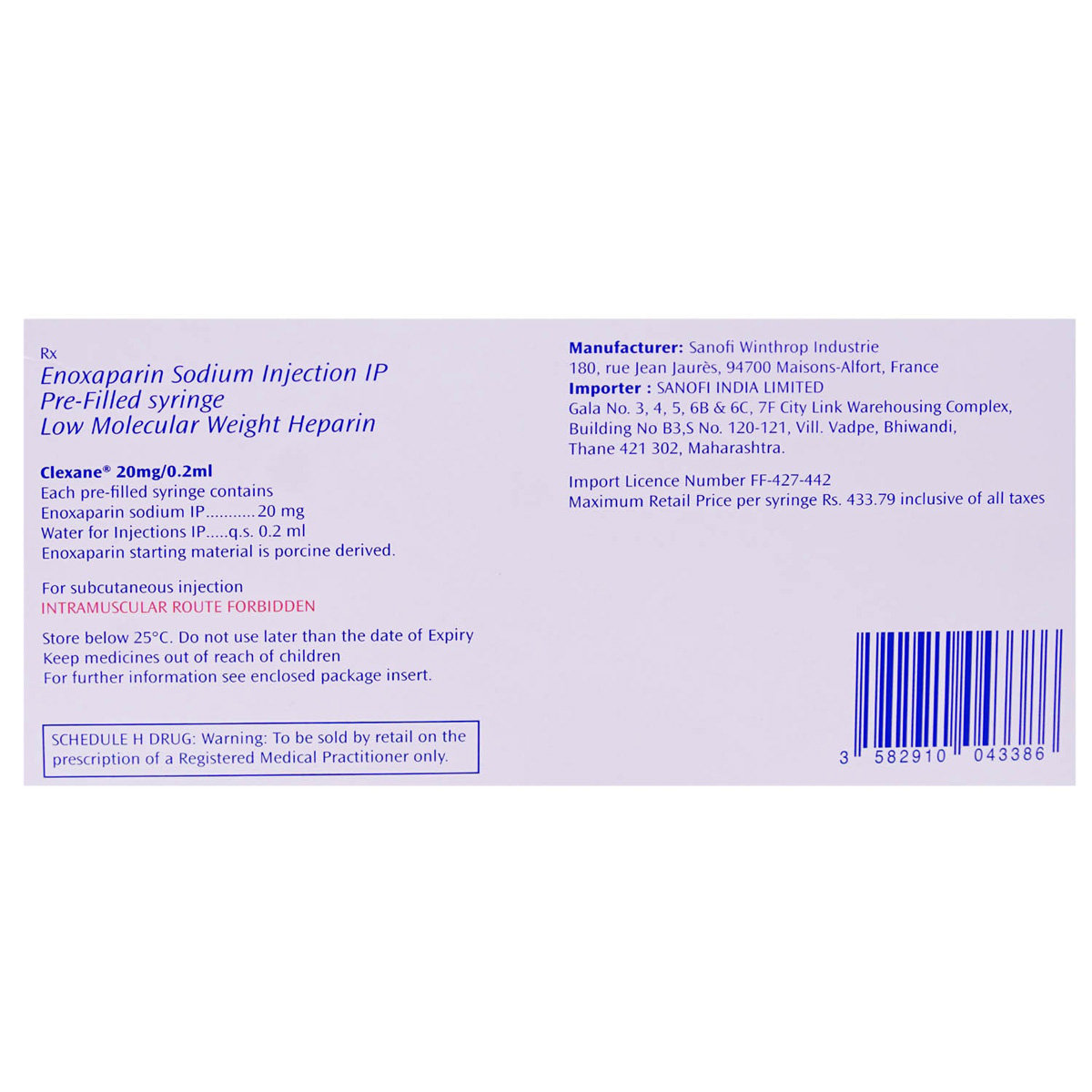Enoxion 20 mg Injection 1's
MRP ₹325
(Inclusive of all Taxes)
₹48.8 Cashback (15%)
Provide Delivery Location
Online payment accepted
 Prescription drug
Prescription drugWhats That
Composition :
Manufacturer/Marketer :
Consume Type :
Expires on or after :
Return Policy :
About Enoxion 20 mg Injection
Enoxion 20 mg Injection belongs to a class of medications known as blood thinners or anticoagulants. It helps to treat harmful blood clots in your blood. Furthermore, Enoxion 20 mg Injection can prevent or treat blood clots caused by a variety of medical conditions, such as unstable angina, after an operation or long periods of bed rest due to illness, after a heart attack, and blood clots forming in your dialysis machine's tubes. A blood clot is a mass of blood that forms when platelets, proteins, and cells in the blood stick together. A blood clot can occur in any body part, leading to a heart attack, stroke, and organ damage (even coma or death).
Enoxion 20 mg Injection contains Enoxaparin, which is low molecular weight heparin. Enoxion 20 mg Injection works by preventing existing blood clots from growing larger, allowing your body to break them down and prevent them from harming you. On the other hand, it inhibits the formation of new blood clots in your blood.
Enoxion 20 mg Injection will be administered by a healthcare professional; do not self-administer. You may experience bleeding, increased liver enzymes, skin rash (hives, urticaria), itchy red skin, bruising or pain at the injection site, and headache as side effects of Enoxion 20 mg Injection. Most of these side effects do not require medical attention and gradually resolve over time. However, if the side effects are persistent, report to your doctor immediately.
If you are known to be allergic to Enoxion 20 mg Injection or any other medicines, inform your doctor. If you are pregnant or breastfeeding, it is advised to inform your doctor before receiving the Enoxion 20 mg Injection. Also, disclose to your doctor if you have any pre-existing medical conditions like a stomach ulcer, recent surgery of the brain or eyes or spine, recent bleeding stroke, diabetes, high blood pressure, or recent onset of stroke or kidney or liver disorders. And also, let your doctor know if you are underweight or overweight or if you have high levels of potassium in your blood.
Uses of Enoxion 20 mg Injection
Directions for Use
Key Benefits
Enoxion 20 mg Injection contains Enoxaparin, which is low molecular weight heparin or LMWH. It helps to treat harmful blood clots that are in your blood. Besides, this Enoxion 20 mg Injection can stop blood clots due to several medical conditions, including unstable angina, after an operation or long periods of bed rest due to illness, after a heart attack, and blood clots forming in the tubes of your dialysis machine. Enoxion 20 mg Injection works by stopping existing blood clots from getting any bigger; this helps your body to break them down and prevents them from causing you harm. On the other hand, it stops new blood clots from forming in your blood.
Storage
- Managing a low platelet count (thrombocytopenia) caused by medication usage requires a multi-step approach. Here are some steps to help manage the condition:
- Inform your doctor about your low platelet count and medication usage. They will assess the situation and guide the best course of action.
- Your doctor may recommend adjusting or stopping the medication that is causing a low platelet count. This could involve switching to alternative medication or reducing the dosage.
- Monitor your platelet count regularly through blood tests to track any changes. This will help the doctor determine the effectiveness of the treatment plan.
- If an underlying condition, such as infection or inflammation, contributes to the low platelet count, your doctor will treat it.
- In some cases, alternative treatments like platelet transfusions or medications that stimulate platelet production may be necessary.
- Avoid risky activities and certain medications; eat a balanced diet with plenty of water to reduce bleeding risk and boost overall health.
- If you experience severe bleeding or bruising, seek emergency medical attention immediately.
- Follow a balanced diet by including fruits, vegetables, and whole grains.
- Increase fibre intake as it aids toxin removal.
- Avoid processed foods and sugary drinks.
- Aim for moderate-intensity exercise for most days of the week.
- Quit smoking, as it can worsen liver health.
- Manage stress with meditation or yoga.
- Monitor liver function through regular blood tests.
- Consume more fruits, vegetables, and cruciferous foods like cabbage, kale, and broccoli.
- Reduced alcohol intake can enhance liver enzyme function.
- Oxidative stress can be managed by eating foods rich in antioxidants, such as vitamins C and E.
- Liver function tests regularly can help manage increased levels of AST.
- Inform your doctor about the nausea and discuss possible alternatives to the medication or adjustments to the dosage.
- Divide your daily food intake into smaller, more frequent meals to reduce nausea.
- Opt for bland, easily digestible foods like crackers, toast, plain rice, bananas, and applesauce.
- Avoid certain foods that can trigger nausea, such as fatty, greasy, spicy, and smelly foods.
- Drink plenty of fluids, such as water, clear broth, or electrolyte-rich beverages like coconut water or sports drinks.
- Use ginger (tea, ale, or candies) to help relieve nausea.
- Get adequate rest and also avoid strenuous activities that can worsen nausea.
- Talk to your doctor about taking anti-nausea medication if your nausea is severe.
- Record when your nausea occurs, what triggers it, and what provides relief to help you identify patterns and manage your symptoms more effectively.
- Inform Your Doctor: Notify your doctor immediately about your diarrhoea symptoms. This allows them to adjust your medication or provide guidance on managing side effects.
- Stay Hydrated: Drink plenty of fluids to replace lost water and electrolytes. Choose water, clear broth, and electrolyte-rich drinks. Avoid carbonated or caffeinated beverages to effectively rehydrate your body.
- Follow a Bland Diet: Eat easy-to-digest foods to help firm up your stool and settle your stomach. Try incorporating bananas, rice, applesauce, toast, plain crackers, and boiled vegetables into your diet.
- Avoid Trigger Foods: Steer clear of foods that can worsen diarrhoea, such as spicy, fatty, or greasy foods, high-fibre foods, and dairy products (especially if you're lactose intolerant).
- Practice Good Hygiene: Maintain good hygiene to prevent the spread of infection. To stay healthy, wash your hands frequently, clean and disinfect surfaces regularly, and avoid exchanging personal belongings with others.
- Take Anti-Diarrheal Medications: If your doctor advises, anti-diarrheal medications such as loperamide might help manage diarrhoea symptoms. Always follow your doctor's directions.
- Keep track of your diarrhoea symptoms. If they don't get better or worse or are accompanied by severe stomach pain, blood, or dehydration signs (like extreme thirst or dark urine), seek medical help.
- Apply pressure for 5-10 minutes to reduce bleeding.
- Apply cold compresses or ice packs for 15-20 minutes, repeat every few hours.
- Consult the doctor and use antihistamines if advised to minimise injection site reaction.
- Use pain relief medication, like acetaminophen if recommended by the doctor, but avoid NSAIDs if bleeding is a concern.
- Rotate injection sites and use proper needle size and technique if you are self-administering the medication.
- Monitor signs such as increased pain, redness, warmth, or pus, and seek medical attention if symptoms worsen.
Drug Warnings
Patients should inform the doctor if they are on active treatment with this Enoxion 20 mg Injection before any surgery is scheduled. If you are known to be allergic to Enoxion 20 mg Injection or any other medicines, inform your doctor. If you are pregnant or breastfeeding, it is advised to inform your doctor before using the Enoxion 20 mg Injection. Before using this Enoxion 20 mg Injection, disclose to your doctor if you have any pre-existing medical conditions like stomach ulcer, recent surgery of the brain or eyes or spine, recent bleeding stroke, diabetes, high blood pressure, or recent onset of stroke or kidney or liver disorders, And also let your doctor know if you are underweight or overweight or if you have high levels of potassium in your blood.
Drug-Drug Interactions
Drug-Drug Interactions
Login/Sign Up
Combining Mifepristone with Enoxion 20 mg Injection can increase the risk or severity of side effects of vaginal bleeding.
How to manage the interaction:
Taking Enoxion 20 mg Injection with Mifepristone is not recommended as it can result in an interaction, it can be taken if a doctor has advised it. However, if you experience prolonged, excessive bleeding, you should contact a doctor immediately. Do not stop using any medications without talking to a doctor.
Combining Defibrotide with Enoxion 20 mg Injection can increase the risk of bleeding.
How to manage the interaction:
Taking Enoxion 20 mg Injection with Defibrotide is not recommended as it can result in an interaction, it can be taken if your doctor has advised it. However, if you notice any unusual bleeding or bruising, other signs of bleeding, dizziness, lightheadedness, red or black tarry stools, coughing up or vomiting blood, severe headache, and weakness, you should contact a doctor immediately. Do not stop using any medications without talking to a doctor.
Taking Flurbiprofen with Enoxion 20 mg Injection can increase the risk of bleeding and hemorrhage.
How to manage the interaction:
Although there is a possible interaction between Flurbiprofen and Enoxion 20 mg Injection, you can take these medicines together if prescribed by your doctor. If you notice any of these signs, bleeding, bruising, swelling, headache, feeling lightheaded, weakness, or seeing blood in your urine or stools, contact a doctor immediately. Do not stop using any medications without a doctor's advice.
The combined use of Enoxion 20 mg Injection and Ibuprofen can increase the risk of bleeding problems.
How to manage the interaction:
Co-administration of Enoxion 20 mg Injection and Ibuprofen can lead to an interaction, it can be taken if advised by your doctor. However, if you experience any symptoms like unusual bleeding or bruising, swelling, vomiting, blood in your urine or stools, headache, dizziness, or weakness, consult the doctor immediately. Do not stop using any medications without a doctor's advice.
Co-administration of Meloxicam with Enoxion 20 mg Injection together can increase the risk or severity of bleeding.
How to manage the interaction:
Although taking Meloxicam and Enoxion 20 mg Injection together can cause an interaction, it can be taken if a doctor has suggested it. If you notice any symptoms like bleeding, bruising, swelling, vomiting, headache, dizziness, weakness, or blood in your urine or stool, contact a doctor right away. Do not stop using any medications without talking to a doctor.
Combining Enoxion 20 mg Injection with Dalteparin can increase the risk of bleeding.
How to manage the interaction:
Although taking Dalteparin and Enoxion 20 mg Injection together can cause an interaction, it can be taken if your doctor has suggested it. If you notice any symptoms like bleeding, severe headaches, weakness, or vomiting, it's important to consult a doctor immediately. Do not discontinue any medications without first consulting a doctor.
Combining Fenoprofen with Enoxion 20 mg Injection can increase the risk of bleeding and hemorrhage.
How to manage the interaction:
There may be a possibility of interaction between Fenoprofen and Enoxion 20 mg Injection, but it can be taken if advised by a doctor. If you notice any symptoms like bruising, swelling, vomiting, headache, blood in your urine or stools, dizziness, or weakness make sure to contact a doctor immediately. Do not stop using any medications without a doctor's advice.
Combining Enoxion 20 mg Injection with Tinzaparin can increase the risk of bleeding.
How to manage the interaction:
Although taking Enoxion 20 mg Injection and Tinzaparin together can cause an interaction, it can be taken if your doctor has suggested it. If you notice any of these symptoms like back pain, bleeding, bruises, dizziness, lightheaded, dark or black stools, a severe headache, weakness, or vomiting it's important to call a doctor right away. Do not stop using any medications without talking to a doctor.
Dabigatran Etexilate can make Enoxion 20 mg Injection more effective at preventing blood clotting, this can increase the risk or severity of bleeding.
How to manage the interaction:
There may be a possibility of interaction between Enoxion 20 mg Injection and Dabigatran Etexilate, but it can be taken if prescribed by a doctor. If you notice any of these signs, it's important to contact a doctor right away: bleeding that doesn't stop, blood in your stool, dizziness, dark or bloody stools, headache, weakness, or vomiting blood. Do not stop using any medications without talking to a doctor.
Taking Enoxion 20 mg Injection together with phenylbutazone can increase the risk or severity of bleeding complications.
How to manage the interaction:
Although taking Enoxion 20 mg Injection and Phenylbutazone together can cause an interaction, it can be taken if your doctor has suggested it. If you notice any of these signs like difficulty with bleeding, bleeding, bruising, swelling, throwing up, headache, feeling lightheaded, weakness, or blood in your urine or stools it's important to contact a doctor immediately. Do not discontinue any medications without consulting a doctor.
Drug-Food Interactions
Drug-Food Interactions
Login/Sign Up
Diet & Lifestyle Advise
- A low cholesterol diet and a regular exercise regime complement treatment with Enoxion 20 mg Injection effectively.
- As a precautionary measure, you are recommended not to consume alcohol, or junk food items from outside, stick to a freshly prepared home-cooked meal and rest properly for a speedy recovery.
- And also, trying to replace most of your saturated fats with unsaturated fats can reduce total cholesterol and LDL in a short time.
- Foods like avocados, olive oil, fatty fish, and nuts contain many heart-healthy unsaturated fats, so eating them regularly is beneficial.
- Option for foods high in vitamin K (liver, leafy green vegetables, or vegetable oils) as Enoxion 20 mg Injection may lower Vitamin K in your body.
- Avoid drinking alcohol as it increases the risk of gastrointestinal ulcer/bleeding.
- Cranberry juice, grapefruit juice, noni juice, and pomegranate juice may interact with Enoxion 20 mg Injection and lead to unwanted side effects. Hence try to avoid these juices while taking Enoxion 20 mg Injection.
Side Effects of Enoxion 20 mg Injection
- Bleeding
- Increases in liver enzymes
- Bruise more easily than usual
- Pink patches on your skin
- Skin rash (hives, urticaria)
- Itchy red skin
- Bruising or pain at the injection site
- Decreased red blood cell count
- High platelet counts in the blood
- Headache
Habit Forming
Therapeutic Class
All Substitutes & Brand Comparisons
RX
Out of StockFlohep 20mg Injection
Fusion Health Care Pvt Ltd
₹55
(₹49.5 per unit)
83% CHEAPERRX
Out of StockThrombiflo 20mg Injection
Torrent Pharmaceuticals Ltd
₹322
(₹144.9/ 1ml)
50% CHEAPERRX
Lmwx 20 mg Injection 0.2 ml
Abbott India Ltd
₹235
(₹211.5 per unit)
27% CHEAPER
Drug-Diseases Interactions
Drug-Diseases Interactions
Login/Sign Up
FAQs
Drug-Drug Interactions Checker List
- ASPIRIN
- IBUPROFEN
- HEPARIN
- WARFARIN
- RIVAROXABAN
- DEXTRAN INJECTION
- PREDNISOLONE
- DEXAMETHASONE
Special Advise
Regular blood tests are advised while taking Enoxion 20 mg Injection to monitor prothrombin, platelets, and coagulation time on a regular basis.
Disease/Condition Glossary
A blood clot can occur in any part of the body, leading to a heart attack, stroke, and damage to organs (even coma or death). Blood clots can reach your arteries or veins in the organs like the brain, kidney, heart, lungs, and limbs. Conditions like atherosclerosis, diabetes, heart failure, irregular heartbeat (arrhythmia), and obesity/overweight can trigger excessive blood clotting in the brain and heart. On the other hand, deep vein thrombosis (blood clot in veins), peripheral artery disease (narrowed arteries due to fat deposit or blood clot), and atherosclerosis (fat built upon the walls of the arteries) can cause a blood clot in your limbs.

Have a query?
Alcohol
Safe if prescribed
Limit intake of alcohol as it may increase the risk of bleeding.
Pregnancy
Consult your doctor
Enoxion 20 mg Injection is not recommended for use in pregnancy unless clearly necessary. So, inform your doctor if you are pregnant or suspect pregnancy. Your doctor will weigh the benefits and potential risks before prescribing Enoxion 20 mg Injection.
Breast Feeding
Consult your doctor
Enoxion 20 mg Injection is not recommended for use in breastfeeding unless clearly necessary. So, inform your doctor if you are a nursing mother. Your doctor will weigh the benefits and potential risks before prescribing Enoxion 20 mg Injection.
Driving
Safe if prescribed
It does not affect your ability to drive.
Liver
Consult your doctor
If you have a history of liver diseases or pre-existing liver conditions, please inform your doctor before taking this Enoxion 20 mg Injection. Your doctor will prescribe only if the benefits outweigh the risks.
Kidney
Consult your doctor
If you have a history of kidney diseases or pre-existing kidney conditions, please inform your doctor before taking this Enoxion 20 mg Injection. Your doctor will prescribe only if the benefits outweigh the risks.
Children
Safe if prescribed
It is not recommended for treatment in children under 18 years of age as safety and efficacy have not been established.

